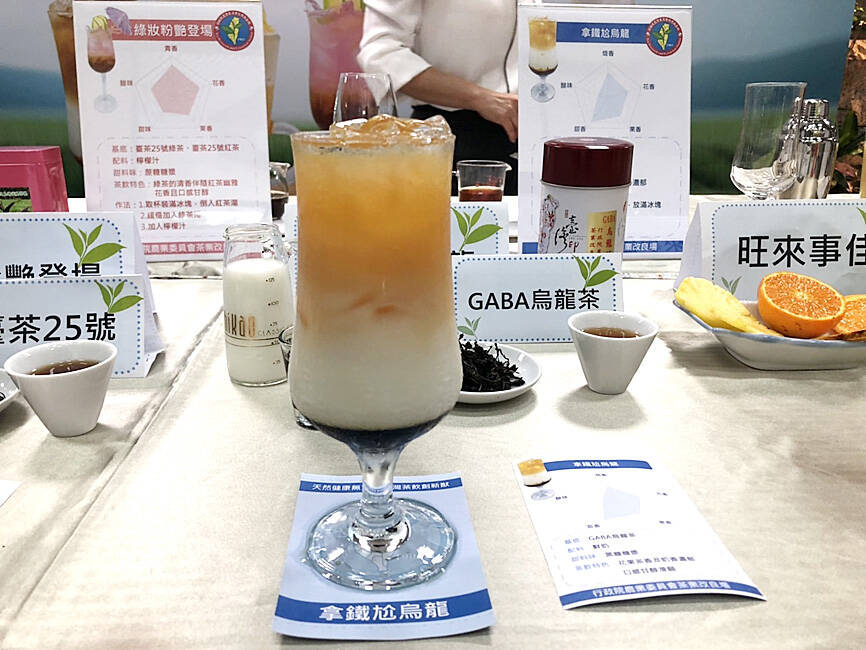The maximum daily intake of food additive gamma-aminobutyric acid (GABA), used for its calming effects, would be reduced to no more than 100mg, the Ministry of Health and Welfare said on Thursday.
GABA is an amino acid that helps promote normal brain functioning by blocking stress-related messages from reaching receptor sites in the central nervous system.
It is present in some natural and fermented foods, including spinach, oats, wheat, barley and kimchi.

Photo: Yang Yuan-ting, Taipei Times
GABA is increasingly used as an additive in juice, soft drinks, jelly and chocolate.
However, the Food and Drug Administration (FDA) said that GABA could be harmful when consumed with alcohol, medicine for lowering blood pressure or sedatives, which could enhance their effects.
FDA Deputy Director Lin Chin-fu (林金富) said that GABA occurs naturally in many plants, and is also found in higher concentrations in lactic acid-fermented food such as sauerkraut and kimchi.
People are looking for food products that could aid their sleeping or be used as a sedative, so more producers are incorporating GABA into their products, he said.
The new draft guideline would place a limit of 100mg of GABA in products if it is derived from the fermentation process of microbial culture, the FDA news release said.
These products must also carry a warning saying: “Users of this product should refrain from consuming alcohol, ingesting medicine to lower blood pressure, sedatives and anti-seizure drugs” and “Pregnant women, those breastfeeding and infants should first consult with a medical doctor before consuming the product,” the release said.
In Canada, the daily recommended intake for GABA no more than 300mg, Lin said.
However, after consultation with experts, the FDA would place the limit in Taiwan at 100mg, because Taiwanese already consume relatively higher levels of GABA due to their dietary habits.
The draft plan would take affect after a 60-day public consultation period, Lin said.
However, the warning message is scheduled to take effect on Jan. 1, 2026, he added.
After the regulation comes into effect, including the requirement to display GABA levels and a warning on packaging, those who contravene the regulation would be fined between NT$30,000 and NT$3 million (US$938 and US$93,820) under the Act Governing Food Safety and Sanitation (食品安全衛生管理法), Lin said.
Additional reporting by CNA

The Ministry of Education (MOE) is to launch a new program to encourage international students to stay in Taiwan and explore job opportunities here after graduation, Deputy Minister of Education Yeh Ping-cheng (葉丙成) said on Friday. The government would provide full scholarships for international students to further their studies for two years in Taiwan, so those who want to pursue a master’s degree can consider applying for the program, he said. The fields included are science, technology, engineering, mathematics, semiconductors and finance, Yeh added. The program, called “Intense 2+2,” would also assist international students who completed the two years of further studies in

Former president Tsai Ing-wen (蔡英文) departed for Europe on Friday night, with planned stops in Lithuania and Denmark. Tsai arrived at Taiwan Taoyuan International Airport on Friday night, but did not speak to reporters before departing. Tsai wrote on social media later that the purpose of the trip was to reaffirm the commitment of Taiwanese to working with democratic allies to promote regional security and stability, upholding freedom and democracy, and defending their homeland. She also expressed hope that through joint efforts, Taiwan and Europe would continue to be partners building up economic resilience on the global stage. The former president was to first

Taiwan will now have four additional national holidays after the Legislative Yuan passed an amendment today, which also made Labor Day a national holiday for all sectors. The Chinese Nationalist Party (KMT) and Taiwan People’s Party (TPP) used their majority in the Legislative Yuan to pass the amendment to the Act on Implementing Memorial Days and State Holidays (紀念日及節日實施辦法), which the parties jointly proposed, in its third and final reading today. The legislature passed the bill to amend the act, which is currently enforced administratively, raising it to the legal level. The new legislation recognizes Confucius’ birthday on Sept. 28, the

The Taipei District Court sentenced babysitters Liu Tsai-hsuan (劉彩萱) and Liu Jou-lin (劉若琳) to life and 18 years in prison respectively today for causing the death of a one-year-old boy in December 2023. The Taipei District Prosecutors’ Office said that Liu Tsai-hsuan was entrusted with the care of a one-year-old boy, nicknamed Kai Kai (剴剴), in August 2023 by the Child Welfare League Foundation. From Sept. 1 to Dec. 23 that year, she and her sister Liu Jou-lin allegedly committed acts of abuse against the boy, who was rushed to the hospital with severe injuries on Dec. 24, 2023, but did not